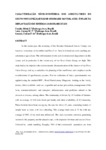Use este identificador para citar ou linkar para este item:
http://www.alice.cnptia.embrapa.br/alice/handle/doc/503002| Título: | Caracterização sócio-econômica dos agricultores do grupo Nova União, Senador Guiomar Santos, Acre: ênfase na implantação de sistemas agroflorestais. |
| Autoria: | FRANKE, I. L.  LUNZ, A. M. P.   AMARAL, E. F. do   |
| Afiliação: | IDESIO LUIS FRANKE, CPAF-AC; AURENY MARIA PEREIRA LUNZ, CPAF-AC; EUFRAN FERREIRA DO AMARAL, CPAF-AC. |
| Ano de publicação: | 2000 |
| Referência: | In: CONGRESSO BRASILEIRO DE ECONOMIA E SOCIOLOGIA RURAL, 38.; CONGRESSO MUNDIAL DE SOCIOLOGIA RURAL, 10., 2000, Rio de Janeiro. Anais... Campinas: Unicamp; Brasília, DF: SOBER, 2000. |
| Páginas: | 19 p. |
| Conteúdo: | In the recent past, the economy of the Senador Guiomard Santos County was based on extraction of the rubber and Brazil nut. Now it is based on cattle ranching and subsistence agriculture. The deforestation levels and environmental degradation in this county and in particular in the community of the Nova Uniao Group are high. This study had as its objective the socioeconomic characterization of the farmers of the Nova Uniao Group, seeking to subsidize the planning of the small farm, with emphasis on the establishment of agroforestry systems. For the collection of data a questionnaire was applied using the method RPP - Rural Participatory Diagnosis, looking at the family history, labor available, land use, vegetable and animal production, management of the farm, commercialization and transport, infrastructure, and problems related to the productive process, among others. The community is formed by 43 families of farmers, with an average of 4,12 individuals per family and labor availability of 2,5 mans/day. These families have been occupying the area for about 12 years, consisting mainly of people born in Acre, with low schooling. The average farm area is 43 ha with and average of 50% of the total area deforested. The main economic activities generating income in the property are the annual crops, with emphasis for bean and cassava flour, followed by cattle ranching. Roughly 70% of the commercial operations are done through the intermediaries, due to the lack of transport and farmers' organization. The extension services are deficient. The main problems that affect the community are related to the low educational and technological level of the production systems and the poor infrastructure conditions and deficiency in the basic services. The diversification of the crops and the integration of the production are stability factors for the farmers, and agroforestry systems, while alternative land use systems, can become a viable option for improvement of their socioeconomic conditions and, at the same time, guarantee the environmental conservation. |
| Thesagro: | Desenvolvimento Socio-Econômico Agrossilvicultura Pequeno Produtor |
| NAL Thesaurus: | Socioeconomic status Agroforestry Small farms |
| Palavras-chave: | Sistema agroflorestal (SAF) Agroforestería Granjas pequeñas Estrato socioeconómico Grupo Nova União Senador Guiomard (AC) Amazonia Occidental Acre Amazônia Ocidental Western Amazon |
| Tipo do material: | Artigo em anais e proceedings |
| Acesso: | openAccess |
| Aparece nas coleções: | Artigo em anais de congresso (CPAF-AC)  |
Arquivos associados a este item:
| Arquivo | Descrição | Tamanho | Formato | |
|---|---|---|---|---|
| 11853.pdf | 402,01 kB | Adobe PDF |  Visualizar/Abrir |









